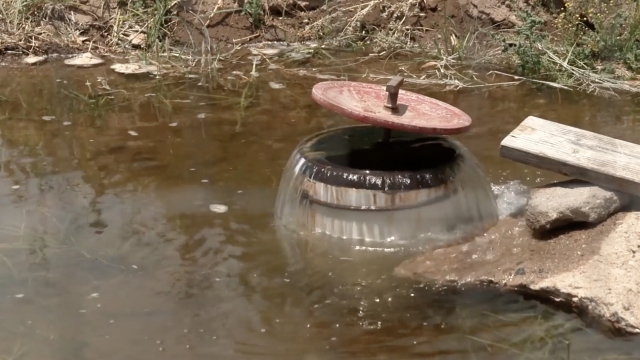Arizona is tightening the use of groundwater and pausing some construction in fast-growing cities to correct an overallocation of water.
A new model, years in the making, showcases the availability of groundwater in the Phoenix Active Management Area (AMA). The AMA covers 5,600 square miles and is home to 4.6 million residents. The Arizona Department of Water Resources used the model to forecast groundwater conditions over the next 100 years. Research revealed groundwater overuse.
"If we do nothing, we could face a 4% shortfall in groundwater supplies over the next 100 years," Gov. Katie Hobbs said during a press conference in which she also announced a construction pause. "We will pause approvals of new assured supply determinations that rely on pumping groundwater, ensuring that we don't add to any future deficit."
The announcement drew frustration from Mark Schnepf, who runs one of the largest peach farms in Arizona. His farm in Queen Creek has been in the family for nearly 82 years.
"I use my land as collateral for the loans, and the land is valuable because it has development opportunity to it," Schnepf said. "If you take that water away from it and I don't have development opportunity, then it impacts my ability to run my farming operation because I have a challenge in getting the loans that I need in order to run my farm."
Some farmers have grandfathered rights to groundwater on their property for agricultural use, but Schnepf said it does not transfer for development use. He estimates it will cost him thousands of dollars to work with the city to ensure water rights to maintain his land value.
"They just don't understand the intricacies of how important it is to have groundwater available for development rights," Schnepf said.
Developers rely on cheap groundwater to build homes outside of major cities.
"There are other ways they can meet the certificate requirements," Arizona Department of Water Resources Director Tom Buschatzke said. "They can bring in non-groundwater resources from outside the AMA. They can utilize long-term storage credits that are already under the ground, they can use recycled water."
Hobbs said the approval of 80,000 housing developments already granted assured water certificates will not be impacted.
Phoenix is the fifth-largest city in the nation. Maricopa County, the county Phoenix resides in, gained nearly 57,000 new residents in 2022, a 1.3% increase from the previous year, according to the Census. Cities on the edges of metro Phoenix include Buckeye and Queen Creek. Those two cities topped the charts for population growth across the nation between July 2020 and July 2021.
SEE MORE: Florida's new immigration law creates 'panic' in agriculture community
Buckeye Mayor Eric Orsborn said his city secured 23,000 single-family homes out of the 80,000 housing approvals.
"Buckeye is poised for continuous growth for at least the next decade," Orsborn wrote in a statement he released to Scripps News.
Buckeye is 14% developed and has the potential to grow its population more than thirteenfold, from an estimated 110,000 residents to 1.5 million, according to the city website. But securing water may be a challenge for a population that large.
The city of Queen Creek is 92% built out and secured 15,000 developments. Mayor Julia Wheatley said it's enough to keep them busy for the next 10 years, and added that they are working with developers to find alternate water resources to develop the other 8% of their city.
Arizona has a housing shortage of 270,000 units; combined, Buckeye and Queen Creek secured 38,000 housing units. It's unclear how long the pause on construction reliant on groundwater will last.
Many worry the pause on development will drive up housing prices.
This May, the median cost of a home in Queen Creek was $621,000 and in Buckeye, $395,000, according to Redfin.
Both mayors downplayed potential impacts of the announcement to their cities.
"For Queen Creek it's not very impactful," Wheatley said. "We've been planning on this as far as investing in renewable water resources for many years, at least a decade."
Paul Gardner, the Queen Creek Water Resources director, said the city has spent millions of dollars over several years to help diversify the city's water portfolio.
"We have moved from about 90% relying on groundwater to about 50%," Gardner said. "In the next five years, we're going to move to about 10% or 5% reliant upon groundwater."
The move away from groundwater is expected to raise the price of water for residents.
SEE MORE: 3 Western states have agreed to cut water consumption
Gardner said Queen Creek budgeted $60 million last year for renewable supplies; this year the budget is $168 million; and next year he predicts they will spend an additional $100 million to $150 million.
He said, in short, residents will eventually end up paying more for water.
Ryan Mitchell, the chief hydrologist at the Arizona Department of Water Resources, says it's important for the state to act now and correct course after over-allocating groundwater. He said a shift in water use can help replenish and recharge the aquifer and rivers.
"Let's increase the use of recycled, affluent, renewable waters; let's use conservation methods to reduce the volume that we actually need to serve people and then what you'll end up doing is you're reducing the water budget," Mitchell said.
Agriculture consumes about 74% of water in Arizona, down from 90% in the past.
In Queen Creek, an area known for its farmlands, the views are changing.
"Those beautiful farmlands that we love and are so near and dear to our heart are turning into residences," Wheatley said.
The move reduces groundwater use but puts in jeopardy the future of family farming.
"Farms do take a lot more water than residential uses, but we all have to eat," Schnepf said.
Trending stories at Scrippsnews.com




